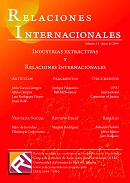Keywords:
Niger Delta , oil industries , energetic safety , human safetyCopyright (c) 2009 Jesús GARCÍA LUENGOS

This work is licensed under a Creative Commons Attribution-NonCommercial-NoDerivatives 4.0 International License.
Abstract
The Delta of the Niger is a paradigmatic enclave of what has been called: the narrative of the “curse of the resources”. In this article there are explored the political and social dynamics that have marked the recent history of the country, where an actors’ multiplicity from the local level up to the global one, they have interacted around a fundamental activity, as it is the extraction of oil. The analysis approaches the economic, political, social and environmental impact of this industry, of which they have turned out to be the destabilization of the economic system, a strong militarization as response to the conflict of interests of the different actors, and an enormous degree of environmental degradation. In this context, the civil society has been totally isolated in the distribution of the benefits of this economic activity, and brutally repressed with systematic violations of its rights. To normative level, which is illustrated in this situation, is the crash among two manners of understanding the safety, where nowadays it is given priority to the energetic safety on the concept of human safety.





